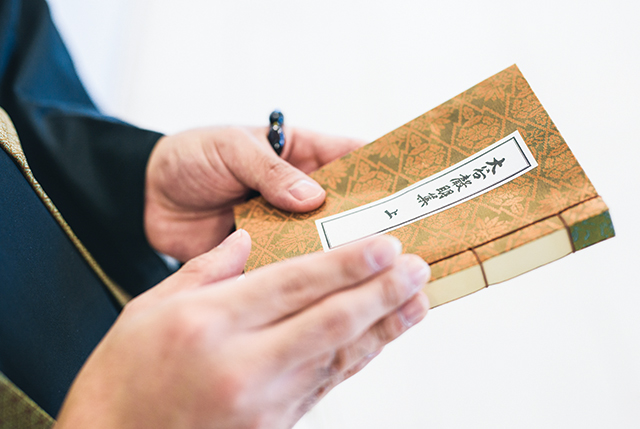Special Course: Buddhism Studies
A one-year short course that provides full-time intensive lessons on Shinran Shonin’s (1173-1263) teachings. It offers the opportunity to learn together with fellow students from various backgrounds, ages and upbringings.
Centering on the study of Buddhism and Shin Buddhism, students explore the teachings and truths of Buddhism in a contemporary context.

Along with regular classes, the Special Course offers a Practical Edification Program, which is a one-day and overnight training program at the Shinshu Otani-ha Nagoya Temple. Additionally, overnight training is held at Doho University’s Chibun Kaikan three times a year to address topics, such as bioethics and war and peace.
Students can explore the meaning of edification through firsthand experiences, such as attending religious ceremonies on campus, including Hōonkō ( the gathering for repaying our debt of gratitude for Shinran Shōnin), and participating in public lectures and fieldwork at historic sites. Students who complete the elective subjects (3 subjects totaling 6 credits) and the first and second semester training at Higashi Honganji (Kyoto) are eligible to acquire the Shinshu Otani-ha “Fully Ordained Priest”
Students can explore the meaning of edification through firsthand experiences, such as attending religious ceremonies on campus, including Hōonkō ( the gathering for repaying our debt of gratitude for Shinran Shōnin), and participating in public lectures and fieldwork at historic sites. Students who complete the elective subjects (3 subjects totaling 6 credits) and the first and second semester training at Higashi Honganji (Kyoto) are eligible to acquire the Shinshu Otani-ha “Fully Ordained Priest”
Qualifications available through this program
Shinshu Otani-ha “Fully Ordained Priest”
Students can acquire this certification by taking elective courses and completing the teacher training for the first and second semesters. (students must participate in a tokudo ceremony to become a Buddhist priest)
Practical learning in the Special Course
The Special Course offers practical learning with a focus on fostering sound self-awareness among students as practitioners of Shin Buddhism.
Centering on overnight training sessions held at the Chibun Kaikan and Shinshu Otani-ha Nagoya Temple, practical learning is conducted in the following ways.
Centering on overnight training sessions held at the Chibun Kaikan and Shinshu Otani-ha Nagoya Temple, practical learning is conducted in the following ways.
Practical Edification Program 1: The Buddha’s View of Humanity—what is the rite to become a priest and what does it mean to walk the path of the Buddha?
By examining how the Buddha, the founder of Buddhism, renounced his home life, students gain insight into what it means to walk the path of the Buddha and live as a priest in Shin Buddhism.
Practical Edification Program 2: The View of Humanity in Shin Buddhism—what does the practice of edification mean to you?
Students explore the philosophical and practical underpinnings of edification in Shin Buddhism with a focus on the central theme expressed through the words “having faith in oneself and teaching others to have faith.”
Overnight training program (conducted 3 times a year)
Several important themes in the relationship between Buddhism and modern society, such as edification activities, temple life, and the Yasukuni Shrine controversies, are examined in a roundtable discussion forum, with issues raised by lecturers from Doho University and other institutions.
University-run religious ceremonies, public lectures at Chibun Kaikan, final report and more
Students attend various Buddhist memorial services, such as a memorial service for the school founder, 住田智見 Sumida Chiken. (1868-1938), Shatokue(gratitude) ceremony, university Hōonkō services, and Shushoe (new year) service, as well as Doho University’s Hōonkō service at Chibun Kaikan. They also take turns to lead the mantra (chosho) and Dharma talks in Shin Buddhist lectures, participate in public lectures twice a year and fieldwork at historical site visits, and compose a final report at the completion of the course.
For details, see Admission Information and Student Application Requirements
